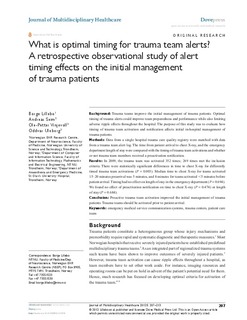| dc.contributor.author | Lillebo, Børge | |
| dc.contributor.author | Seim, Andreas Amdahl | |
| dc.contributor.author | Uleberg, Oddvar | |
| dc.contributor.author | Vinjevoll, Ole-Petter | |
| dc.date.accessioned | 2015-09-25T12:31:58Z | |
| dc.date.accessioned | 2015-10-05T08:53:37Z | |
| dc.date.available | 2015-09-25T12:31:58Z | |
| dc.date.available | 2015-10-05T08:53:37Z | |
| dc.date.issued | 2012 | |
| dc.identifier.citation | Journal of Multidisciplinary Healthcare 2012, 5:207-213 | nb_NO |
| dc.identifier.issn | 1178-2390 | |
| dc.identifier.uri | http://hdl.handle.net/11250/2178765 | |
| dc.description.abstract | Background: Trauma teams improve the initial management of trauma patients. Optimal timing of trauma alerts could improve team preparedness and performance while also limiting adverse ripple effects throughout the hospital. The purpose of this study was to evaluate how timing of trauma team activation and notification affects initial in-hospital management of trauma patients.
Methods: Data from a single hospital trauma care quality registry were matched with data from a trauma team alert log. The time from patient arrival to chest X-ray, and the emergency department length of stay were compared with the timing of trauma team activations and whether or not trauma team members received a preactivation notification.
Results: In 2009, the trauma team was activated 352 times; 269 times met the inclusion criteria. There were statistically significant differences in time to chest X-ray for differently timed trauma team activations (P = 0.003). Median time to chest X-ray for teams activated 15–20 minutes prearrival was 5 minutes, and 8 minutes for teams activated <5 minutes before patient arrival. Timing had no effect on length of stay in the emergency department (P = 0.694). We found no effect of preactivation notification on time to chest X-ray (P = 0.474) or length of stay (P = 0.684).
Conclusion: Proactive trauma team activation improved the initial management of trauma patients. Trauma teams should be activated prior to patient arrival. | nb_NO |
| dc.language.iso | eng | nb_NO |
| dc.publisher | Dove Medical Press | nb_NO |
| dc.title | What is optimal timing for trauma team alerts? A retrospective observational study of alert timing effects on the initial management of trauma patients | nb_NO |
| dc.type | Journal article | nb_NO |
| dc.type | Peer reviewed | en_GB |
| dc.date.updated | 2015-09-25T12:31:58Z | |
| dc.source.volume | 5 | nb_NO |
| dc.source.journal | Journal of Multidisciplinary Healthcare | nb_NO |
| dc.identifier.doi | 10.2147/JMDH.S33740 | |
| dc.identifier.cristin | 941550 | |
| dc.description.localcode | © 2012 Lillebo et al, publisher and licensee Dove Medical Press Ltd. This is an Open Access article which permits unrestricted noncommercial use, provided the original work is properly cited. Creative Commons Attribution Non-Commercial License 3.0. | nb_NO |
